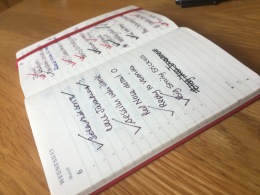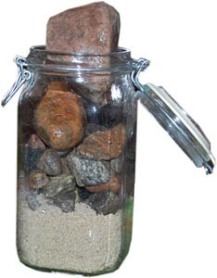A few blogs back I did a piece on how to get inspired as a fundraiser.
This blog is in a similar vein – but it is about the darker side – namely stress. Apologies if you caught an early version of this post – which was sent in error when it was just draft notes, and gave me even more stress! I’ll be back blogging on the new model of fundraising and the need for fundraising to change – but I wanted to highlight this as I know change is not easy and to implement change will mean dealing with the stress that goes with it.
I confess some nights I felt so stressed as a fundraiser I couldn’t sleep. For starters there is that pressure to deliver results always hanging over you (although mostly that feels like a driver). Then there are the internal pressures of managing people, and, of course, people managing you. There is the stress of pitching and presenting or, often as a consultant, delivering a workshop or seminar. Ok so all of these can be exhilarating too.
I’ve had times as a fundraiser when I’ve had all my line reports removed, another when I had my work phone blocked on a Friday before a ‘chat’ with the CEO, and one occasion where a damming email, from a senior member of staff, about my approach to fundraising was accidentally sent to me, not my boss! And of course rejections from potential funders is something that goes with the territory and can create that low or dip. I’ve come to appreciate that fundraising is being able to pick yourself up, brush yourself down, learn from failure, and carry on all the wiser. It’s the underlying stress that can keep you down but it’s by building your resilience that can ensure you can bounce back.
Now I do my own thing and you’d think the stress would be less. It’s not – it just manifests itself differently. If anything it’s harder to deal with. I can get into a mental state where I have to dig myself out of deep hole as a consequence of feeling stressed. Most of the time it’s all in the mind. Hence my ways of coping have become even more important. The more I talk to others about stress, especially working for yourself, the more I’ve come to realise it’s more common than I thought.
So here are my top tips for dealing with stress and/or building my resilience I have found that work for me over the years.

My “RonHill” earlier this week
1. Go for a run or what ever form of exercise works for you. Running definitely helps me cope. Now I try and go most days even if its for a “RonHill” workout. Ron Hill, is a former athlete, better know for his range of running gear, and is also famous for running every day for at least one mile (when he didn’t manage to do this after 52 years it made headline news!)
2. Have a moment to yourself at the start of every working day. Before you sit down at your desk find a cafe and have a moment with your favourite drink to stop and think. I found that pause helped me step back and realise what was the most important thing to focus on for that day. That leads on nicely to my next tip you can do a the same time …

My task diary – a great excuse to buy yet more stationary!
3. Make a task list just for the day. Each year I buy a small diary. I don’t use it to keep a diary of appointments (that’s on the phone). I use to list what I plan to do just for that day. If you keep the diary small you physically can’t put too many tasks on the page. Then you get the pleasure of ticking them off as you make progress throughout the day. When you lack a bit of motivation all you need to do is pick anything on your list and focus on it.
 4. Use Pomodoros. The Pomodoro technique is a time management technique. In essence a pomodoro is a units of 25 minutes of time with 5 minute breaks. When you are struggling with getting started begin a pomodoro. You can read about them here. There are apps you can get too. It’s about giving a big task, especially one you don’t want to do, 25 minutes of your focused attention (once you are several minutes in you find the time flies by). I’m using a pomodoro right now to finish this blog.
4. Use Pomodoros. The Pomodoro technique is a time management technique. In essence a pomodoro is a units of 25 minutes of time with 5 minute breaks. When you are struggling with getting started begin a pomodoro. You can read about them here. There are apps you can get too. It’s about giving a big task, especially one you don’t want to do, 25 minutes of your focused attention (once you are several minutes in you find the time flies by). I’m using a pomodoro right now to finish this blog.

Meeting my peers – the amazing Messrs Sherrington and Lawson on a boat south of Oxford.
5. Simply engage people. Meet your peers or people you admire if you can. Many years ago one of the most effective groups I was involved was a small group of fundraisers who could call on the others to meet whenever they wanted. We called it a house group. It was like an emergency button each of us could use during the year. So ask who would be in your house group and set one up. Now, when working at home, I’ve even set up calls via Skype for no purpose other than to engage a peer. Better still make the effort to meet in person. I always feel better and always inspired as a result.
6. Write down what you have achieved at the end of day and extend that to a monthly summary. Note this is not what you did, it’s what what you achieved. Do the same when you get to the end of the year. Go back to those lists in those moments you knock yourself down.

My ‘stones’ from June 2014!
 When I feel overwhelmed I use what I have come to call my 7th top tip the stones technique. If you had a glass and handful of large stones and sand there are two ways you can fill the glass. Pour in the sand and then add the stones, which won’t fit in the glass (see picture). Or you can put the stones in first and then pour in the sand, which does fit in the glass. The analogy is the glass is the fixed time you have, and the stone are the big tasks you don’t address first because of all the small stuff, the sand.
When I feel overwhelmed I use what I have come to call my 7th top tip the stones technique. If you had a glass and handful of large stones and sand there are two ways you can fill the glass. Pour in the sand and then add the stones, which won’t fit in the glass (see picture). Or you can put the stones in first and then pour in the sand, which does fit in the glass. The analogy is the glass is the fixed time you have, and the stone are the big tasks you don’t address first because of all the small stuff, the sand.
To apply this I simply draw circles to reflect the size of the project or area of work on a page in a book I carry around. These are my stones (see picture for my stones five years ago!). With thanks to Alison Ive of Treehouse who taught me this which I still use.
8. Have a weekend. Get lost doing the gardening or do some cooking or go hiking. I fell in love with gardening for the first time during times of high stress as a fundraiser. Find your outlet. You will need it. And you will be a better fundraiser for it.
9. Sleep on it. You can’t beat sleep. Make sure you get enough. I know I sound like your mum! Throw in relaxation techniques or mindfulness too. I use the Alexander Technique every night to help me relax at the end of the day and if I don’t I just don’t sleep as well.
10. Listen to your gut. If you are not happy in your job and feeling constant stress then perhaps it’s a signal to move on. I woke up one morning and realised I no longer enjoyed my job as a fundraiser (and I thought it was to be my dream job). So that very day I handed in my notice and went on a quest to rekindle my love for fundraising and find the right place for me. It was how I ended up joining SolarAid and so it turned out to be one of the best career decisions I have ever made.
I know that stress goes with the territory of being a fundraiser. And good stress can help propel you. But it can get unhealthy. So build up your resilience so you can bounce back at those times you get knocked down.
If you’ve got some tips and techniques that work for you please share – I’d love to hear about them.



All the hardwork journey experienced stress. It’s the motivation that will determine how you handle your stress. It’s very important to have motivation and let all your emotions out. Trust me, after coping with stress, it will be a great feeling.
LikeLiked by 1 person